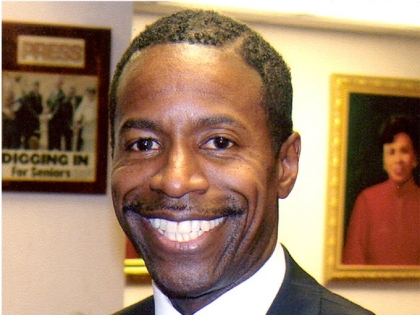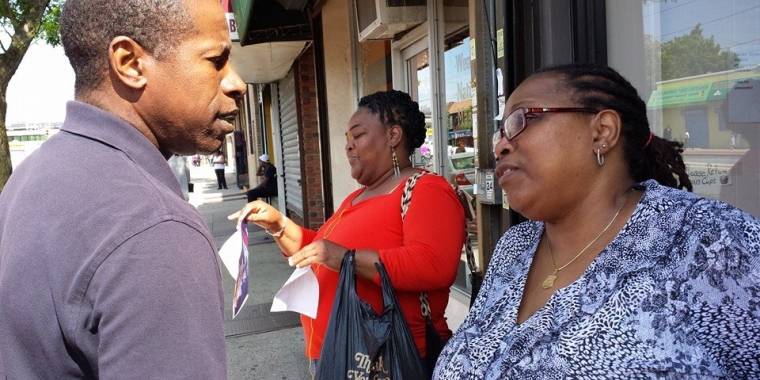
Senate Minority Unveils 'Green Apple Initiative'
Malcolm A. Smith
May 16, 2007
The New York State SenateMinority Conference today announced their "Green Apple Initiative" to protect New York's environment. Democratic Leader Malcolm A. Smith (D-Queens) said the measures are "an important part of our '9 to 5 Agenda' to help families live, grow, work and thrive in the Empire State."
The legislation, announced by Senator Smith and State Senators Neil Breslin (D-Albany), Craig Johnson (D-Port Washington), Bill Perkins (D-Harlem), Eric Schneiderman (D-Manhattan) and Antoine Thompson (D-Buffalo/Niagara Falls), seeks to tackle air pollution, clean up brownfields, halt suburban sprawl and preserve the wetlands that keep our drinking water and waterways safe for recreational use.
"We're here today – Senators representing a wide swath of our state –to take the lead in protecting our environment," Senator Smith said. "We have come up with a strong set of proposals to help safeguard New York's environment. Long after all of us have left office, the protections in this legislation will live on for the benefit of our children and grandchildren."
Environmental and health advocates praised the Democrats' initiative. Mike Seilback of the American Lung Association said "Our recently released State of the Air Report showed that too many New Yorkers are being exposed to unhealthy air. The combustion of sulfur-laden home heating oil contributes significantly to the high ambient concentrations of ozone and fine particles found in New York State – particularly in New York City Metropolitan area. We applaud the Senate Democrats for tackling this issue and urge the full Senate to pass this legislative plan, so that New Yorkers can all breathe a little easier."
Peggy Shepard, executive director of WE ACT For Environmental Justice, said "I applaud the leadership being taken by the Senate Democratic Conference to bring clean air benefits to the most impacted New Yorkers and to clean up contaminated sites for beneficial reuse in our upstate areas. By retrofitting school buses and school boilers and mandating clean fuel alternatives for home furnaces, we can clean the air for those families living in the most polluted areas. It is critical that we protect the most vulnerable among us, our children, many of whom are suffering from epidemic asthma rates due to poor air quality and indifferent leadership."
Clearing the Air
While New York has made tremendous strides in reducing air pollution since the mid-1970's, the state is still exposed to some of the highest air pollution levels in the country.
Senator Perkins said, "Reducing fine particulate matter in our air will prevent thousands of premature deaths and drastically reduce hospitalizations for cardiovascular and respiratory illness."
Perkins, citing statistics from the Environmental Protection Agency (EPA), said the national monetary benefit of reducing mortality alone are estimated to be up to $100 billion per year. Billions more will be saved each year by reducing illness and minimizing the number of lost workdays.
A report released two weeks ago by the American Lung Association of New York revealed that of the 32 New York counties with air pollution monitors, 14 received failing grades. The report also stated that 4.1 million children and 2.3 million seniors are most at risk of breathing dangerous levels of air pollution.
Perkins said part of the problem is the high levels of sulfur found in home heating oil, which makes it the second largest source of sulfur dioxide in the state.
Senate Democrats are proposing a $50 million increase in the Environmental Protection Fund, from $250 million to $300 million, for the sole purpose of creating a new Clean Air Account that would upgrade dirty school boilers statewide, encourage the use of Ultra Low Sulfur Diesel and fund the initial costs of conversions to bio-fuels.
Additionally, Senate Democrats are proposing:
• Legislation requiring a reduction in sulfur to 15 parts per million(PPM) for all heating oil
used in thenon-attainment areas of the State under the Federal Clean Air Act.
• The elimination of the 6,000 ton cap on air pollution fees, generating roughly $9 million per
year. Thiswould pay for the upgrade of 1,800 diesel buses annually.
• An additional $59 million per year to reduce sulfur and particulate matter from the air, the
first in what will be a series of meaningful proposals to change the way New Yorkers
consume energy.
"We're not just clearing the air, we're practicing preventative care," said Senator Perkins. "When we reduce and eliminate pollutants in our atmosphere, we keep our children from making excessive trips to the doctor's office or the emergency room because of health problems that stem from breathing dirty air."
Referring to laws that have eliminated smoking in public facilities, Senator Perkins said: "We've done a good job of cleaning up the indoor air; now, however, we must redouble our efforts to clean up the outdoor air as well."
Turning Brownfields Green
Senator Thompson said the Senate Democrats environmental package would create a mechanism for Public Authority financing for acquisition, cleanup and redevelopment of urban brownfields.
"When businesses close up shop and move away, it can have a devastating effect on a community," Senator Thompson said. "Inactivity can infect and debilitate our inner cities. With no new jobs coming in, crime and drug activity fills the void. What we're proposing would not only combat urban blight, but create jobs as well."
Thompson said the Empire State Development Corporation would be given the power to purchase
contaminated properties, clean them to meet state environmental standards using local, state and federal grants, and sell the properties to businesses for $1.
In exchange, manufacturers would agree to build quality structures, and create new jobs, of which at least 70% must be filled by local residents. These jobs would pay a living wage of at least $9.50 an hour, plus benefits.
"There are brownfields all over the state that pay tribute to our past," said Senator Thompson. "But if you go to Rochester, Utica, Syracuse or Buffalo, you'll see other neglected properties as well: vacant, dilapidated, run-down, and rusted-out buildings that were once manufacturing plants - reminders to what upstate once was. We want to create new, shovel-ready sites that will serve as an invitation to what our state can and will be.
"This is the ultimate in recycling: clean up eyesores in our urban communities and in turn attract companies who are committed to creating good-paying local jobs so that our 9-to-5 families can aspire to a better standard of living." said Thompson.
Stopping the Sprawl
Senator Breslin said New York State loses an average of 174 acres a day to development. "Every day, we lose a little bit of our history and our natural resources," he said. "Each acre of land we lose to strip malls, 'big box' stores and office space is an acre of land we can't get back."
Senator Breslin pointed out that while the upstate population has been sluggish, development has been anything but: Between 1982 and 1997, Central New York lost more than 100,000 acres of forests and farmland to development. Overall, he added, 425,000 acres of upstate land has been converted for commercial use.
"But it's not just upstate," Breslin said. "Final build-out – the point of no return – is less than a decade away in Suffolk County, and half that in Nassau County. We are proposing legislation that will give local municipalities the power to decide how best to protect their natural resources while fostering economic growth."
The Senate Democrats' legislation would:
• Authorize municipalities to raise funds for these purposes through a modest 2% real estate
transfer fee,that, once established (and paid by the buyer) would only apply to that
portion of the sale price above the county median real estate price;
• Require that a public referendum be held to approve the fee;
• Mandate the city or town complete a local community preservation project plan before
holding thereferendum (state grants are available to fund such a plan) and pass local
legislation;
"Allowing municipalities to put preservation funding to a local vote is vital for protecting the
heritageand history of New York's communities," said Senator Breslin. "The state's
undeveloped land isdisappearing at an alarming rate and, given this option, localities
would be able to conserve property more effectively."
Saving Fresh Water
Wetlands are an important part of New York's ecosystem, said Senator Schneiderman, preventing floods, providing habitats for fish and wildlife, supporting various recreational activities and protecting
lakes and rivers by filtering contaminates before they taint the drinking water supply.
"Six years ago, the Supreme Court, in a 5-4 decision, nullified federal jurisdiction over isolated wetlands, leaving them unprotected and vulnerable to commercial interests," Schneiderman said. "The price of losing this valuable natural resource includes possible contamination of the water supply and increased flooding, such as we've seen in Westchester County this year and the Mohawk Valley last year."
Senator Schneiderman has introduced a bill that would amend the current Freshwater Wetlands Act to strengthen protections for freshwater wetlands that are no longer protected by federal law, increase penalties for freshwater wetlands violations and establish permit application fees.
The bill also ensures that property buyers would be given any DEC issued permits with the deed for the property to inform the owner if any structures on their property were constructed in wetlands.
"Critical wetlands have already been destroyed since the federal government abandoned its responsibility to protect them," Senator Schneiderman said. "We must take action now on the state level to protect our wetlands and prevent any further devastating effects to our state's environmental health."
Share this Article or Press Release
Newsroom
Go to NewsroomBlossom Ferguson
May 17, 2014

Girl Scout Recognized for Record Sales
May 15, 2014


